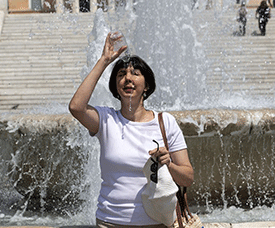Heatwaves, severe droughts cause Europe searing pain
ROME (Xinhua) -- Historic heatwaves and droughts have set the tone for Europe this summer, which has been gripped by blistering heat, devastating forest blazes, little precipitation and dried up rivers and lakes.
The prolonged extreme weather is taking a heavy toll on European countries, which are still beset by rising prices and energy crisis. Experts have warned of reduced agricultural output, hampered shipping and insufficient electricity production, among other challenges.
Climate change, a major cause of the extreme weather, has become a pressing issue to be dealt with more than ever, with Europe struggling to realise its green ambition without risking energy insecurity.
Hot dry spell
Heatwaves scorched Europe earlier than usual, especially in the southern, western and central parts. Multiple countries, including Spain and Britain, have reported record high temperatures, while Portugal recorded a new high of 47 degrees Celsius in mid-July.
 |
| A woman pours water on her head during a heatwave in Athens, Greece, on June 22, 2022. --Photo Xinhua/Marios Lolos |
The Institute of Atmosphere and Climate Science of Italy’s National Research Council said in early August that this year is on pace to be the hottest and driest year in Italy on record dating back to 1800.
Wildfires have become more frequent. This year, some 660,000 hectares of European land have been burned by large fires as of Aug. 13, a record high at this point of the year since data collection began in 2006, according to the European Forest Fire Information System. Aside from Mediterranean countries that are no new victims of fires in summer, such as Portugal, Spain, Italy and Greece, blazes have also ravaged central and northern Europe, damaging buildings and forcing people to flee their homes.
The early heatwaves have worsened the severe drought that began to trouble much of Europe since early 2022 due to persistent lack of precipitation.
Britain officially declared a drought across a large swathe of England. The source of the River Thames in the country has dried up further downstream, and major rivers that run through the European continent have seen water levels drop significantly, including the River Rhine.
In Slovenia, the drought has prompted restrictions on tap water usage and agricultural irrigation, and similar actions are underway in many other nations.
Recent data from the European Commission’s Joint Research Centre (EC-JRC) showed some 47 percent of the territory of the European Union and Britain in drought warning conditions and 17 percent in alert conditions.
The current drought could surpass the 2018 drought to be the worst in 500 years, Andrea Toreti, a senior researcher with the centre, was quoted by media reports in August as saying.
Multifaceted impact
The heatwaves and droughts are creating a multifaceted impact on Europeans, experts have warned.
“Droughts have consequences on the ability of nature to function and provide society with the essentials for life. Biodiversity, particularly soil micro-organisms that maintain soil fertility, may struggle to recover, impacting next year’s farming productivity,” said Mike Rivington, a senior scientist at the James Hutton Institute in Britain.
Dutch media reported an increasing risk of salinisation in the west of the Netherlands as rivers and lakes supply less fresh water. Lack of water and rising water temperatures have also brought about blue-green algae and contributed to fish death.
While global food and fuel prices have seen spikes since the Ukraine crisis intensified, the drought has dealt another blow to Europe’s agriculture, with crop output to be reduced and food prices feared to be further increased.
Rising fertiliser prices, energy and feed costs are putting pressure on farmers, the German Farmers’ Association told local media, adding that if it does not rain consistently soon, the yield of crops could be reduced by 30-40 percent.
In Greece, France, Italy and Hungary, the weather is expected to reduce the production of olive oil, wine, corn and animal feed. Hungarian Minister of Agriculture Istvan Nagy told local media in July that this year’s damage caused by aridity to farmers was already double the total of the past 10 years. Lowered water levels have also caused a headache for shipping, which has a ripple effect on the economy. Due to sizzling temperatures and lack of rain, the River Rhine -- one of the most important waterways in Europe -- is seeing ships “sailing with less than half the usual cargo volumes,” local media reported.
Fuel and raw materials including grain, chemicals, minerals, coal and oil products are all frequently shipped along the River Rhine. The curtailed water transport affects industrial production, and notably limited coal transport for coal-fired power plants, which have regained importance in the region in the wake of the Russia-Ukraine conflict.
The heat and droughts are making the energy crisis in Europe even more intractable, as they disrupt electricity production from hydro, nuclear and wind power plants. Hydropower was reduced in Italy, Spain and Norway, while several nuclear power plants were shut down in France.
(Latest Update August 22, 2022)
|